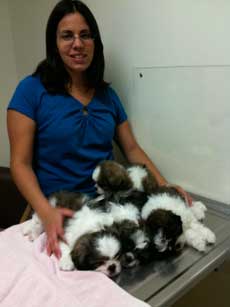Some Essentials for Morris County Owners of Puppies

As soon as your puppy joins your household, schedule his or her first visit to Community Animal Hospital. Bring any available vaccination and medical or adoption records and a stool sample to this visit so our veterinarian can check for internal parasites.
You can expect a complete physical exam and we will discuss parasite control, vaccinations, training, and general health considerations. Don't forget to bring your list of questions—we are your partners in the care of this new pet, and we are here to help.
Puppy Vaccinations
Mother's milk offers pups some protection from disease, but that only lasts a few weeks. As they are weaned from their mother, puppies are given vaccines to protect them from disease. The puppy series of vaccinations gradually builds immunity during the first few months, usually beginning with the first medical exam at around 6—8 weeks.
Puppy series vaccines may include:
- DHPP (distemper, hepatitis, parainfluenza, and parvovirus) vaccine—Started at 6—8 weeks and boostered every 3—4 weeks until at least 14—16 weeks of age
- Rabies vaccine—Given at 12—16 weeks of age
- Leptospirosis vaccine—Given after 12 weeks if puppy has risk of exposure
- Lyme vaccine—Started after 12 weeks of age and boostered 2—4 weeks later
- Bordetella vaccine—Can be started after 8 weeks of age and boostered 2—4 weeks later
- Influenza vaccine—Given after 10 weeks, boosted 4 weeks later
Learn more about vaccinations for your puppy and review our discussion about preventive care.
Feeding Your Puppy
Good quality puppy food is important. Your new puppy may have come with a starter bag of puppy food, or you might have gone to the store and asked for help—but be careful about pet store food recommendations. If you aren't sure about what to feed, please call our office for a recommendation, even before your initial appointment.
Never give a young puppy table food, and always keep lots of fresh clean water available.
Spaying & Neutering
Unless you intend to breed your dog, we recommend spaying or neutering your puppy at around 6 months of age. An altered pet lives longer and generally has fewer medical problems and a better temperament if this is done at an early age. Visit our spay and neuter page for more about this topic.
Meet Rebecca Lorig, DVM
Dr. Rebecca Lorig graduated from Cornell University School of Veterinary Medicine in 2001. She completed a small animal medical and surgical internship at the Oradell Animal Hospital and has been with Community Animal Hospital since 2002.
Dr. Lorig's specific interests include canine and feline internal medicine, small mammals, and the human—animal bond, with advanced training in ultrasonography and grief counseling. She is a member of the American Veterinary Medical Association and the New Jersey Veterinary Medical Association.



